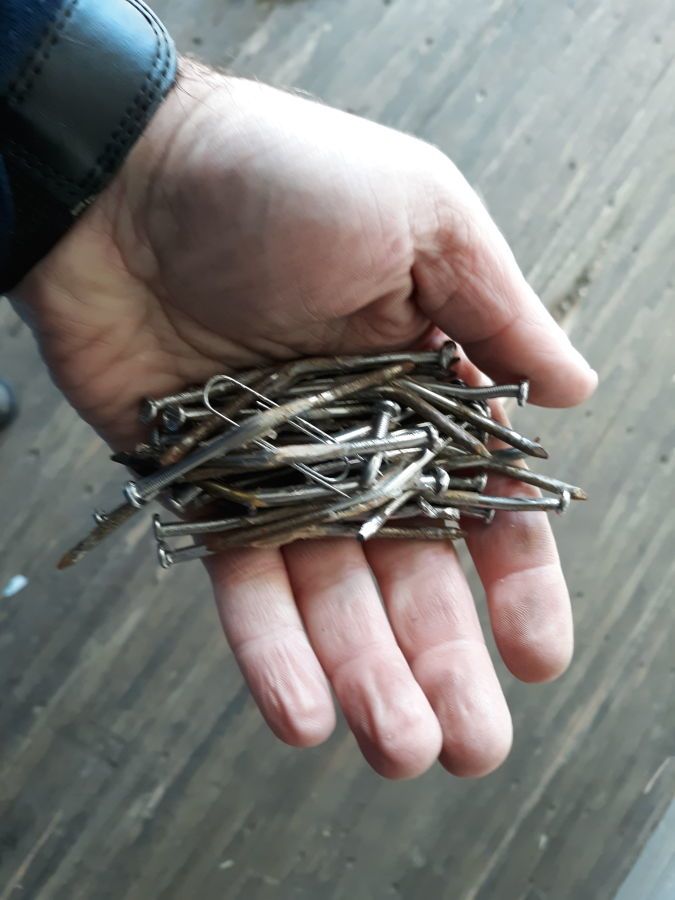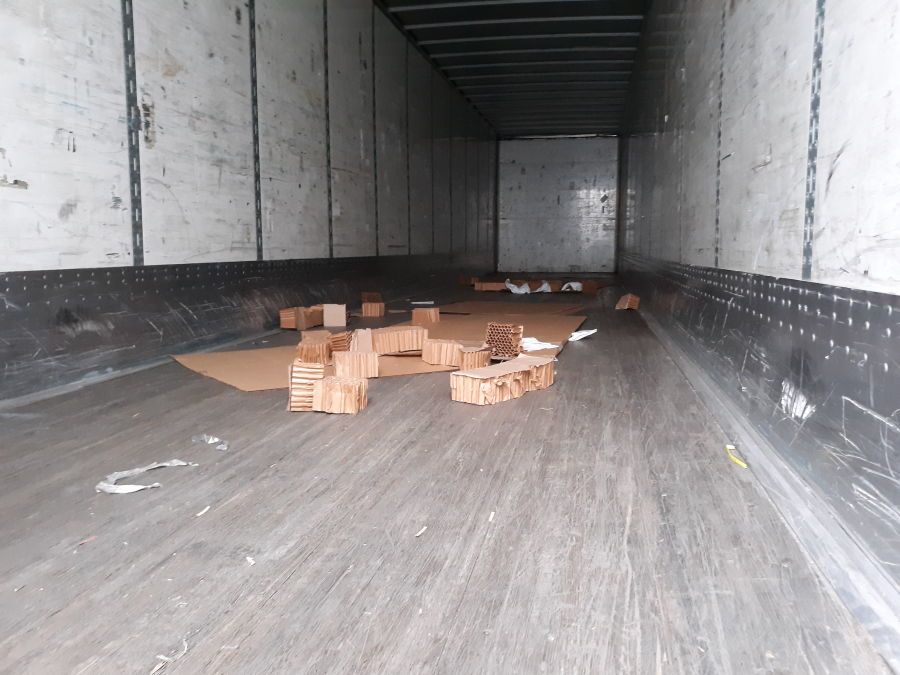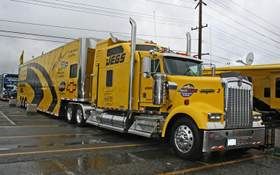Tank Wash? Trailer Wash?
Topic 28638 | Page 2
I pull three different types of tankers-lp, gas/diesel, and asphalt The only one that gets cleaned out on rare occasions are the gas tankers, and that's only if we're hauling something like aviation fuel. We have a wash bay and attendants, so to wash out a trailer consists of us just dropping it off and picking it up the next day. Our asphalt trailers haul nothing else, and seriously never get washed out. One reason being that even a small amount of water in an asphalt tank is extremely dangerous. My company is strict enough about preventing this that we can't even wash the outside of our asphalt trailers when they are empty. You've got to leave the thumb down on our older trailers to break the seal on the dome lid when empty so the vacuum doesn't lock it down, and because it's no longer an airtight seal, water can trickle in during an aggressive wash. Our trailers are also set up to get a really good drain, so the "heel" your talking about never materializes for us. The miniscule amount of product left over melts the next time a load drops in. The only "washing out" we do for asphalt is running diesel through our valves and pumps to keep them clean. Also, after hauling polymer, we like to run a couple regular asphalt loads right away to flush that goop out.
Wow, thank you ALL SOOOOO MUCH for the replies~! 


PackRat, PJ, WildBill, JakeBrake, Joseph, Pete B., andhe78, and the infamous Old School... omigosh, I remember that 'stinky' thread, hahaha! Could almost 'smell it' as I was reading it~!
PJ, yessir, I'd LOVE more info, as you have time to share; pictures would be wonderful~!
Old School, I remember that thread; omigosh... could almost smell the 'onions' as I was re'reading it, hahaha~!!! Where the heck in Ohio is this landfill you speak of ?!?!? Heck, I 'LIVE' here, and I don't even know, LoL~!
And andhe78, wow ... VERY informative~! Especially the asphalt part; that was always a mind bending 'unknown' for me. Perhaps Ted (the guy we drove for) did the 'diesel' flush of pump/pto/valves/hoses only, then? We never knew, and he wasn't telling. (ergo, my curiosity!) Wonder why our trailers always had a fair amount of heel, and yours don't? Does the 'type' of asphalt matter, ie: different viscosity, perhaps? We hauled mainly 6122 and 3257, in the same trailer(s.) The HZ loads were in a different trailer altogether (non asphalt, 1999) and I didn't get to go on those runs.
Pete B., sounds like they have YOUR washouts set up for success, for sure~!
Yeah, I pretty much figured the dry van guys would either sweep or 'leaf blower' out y'alls trailers; just never knew for sure. I've got a visual of PackRat with his leafblower, looking all tough, haha! (<< I mean that kindly!)
Again, I thank you all.. further info as requested would be appreciated, moreso~!! THANK YOU'S'NS~!!! (on a PS: Wonder if WalMart has different parameters?!?)



Dry Van:
A trailer or truck that that requires no special attention, such as refrigeration, that hauls regular palletted, boxed, or floor-loaded freight. The most common type of trailer in trucking.HOS:
Hours Of Service
HOS refers to the logbook hours of service regulations.

This is about the worst stuff I encounter. Left over trash or lots of nails to pull from blocking on the deck.
My 40 Volt leaf blower is amazing and saves a lot of time.
This is about the worst stuff I encounter. Left over trash or lots of nails to pull from blocking on the deck.
My 40 Volt leaf blower is amazing and saves a lot of time.
Oh, WOW~!!
At least I know my visions WERE correct, haha~!! How the EF?!?!?!? Just wow. Thanks for the photo. 
One part of trucking I've never been privy to.. always curious. (Still don't understand why, when they pull the pallets, dunnage, et al. . . why THEY aren't responsible for that?!?!?? Heck, to ME it's part of THEIR load, IMHO.



Wonder why our trailers always had a fair amount of heel, and yours don't? Does the 'type' of asphalt matter, ie: different viscosity, perhaps? We hauled mainly 6122 and 3257, in the same trailer(s.) The HZ loads were in a different trailer altogether (non asphalt, 1999) and I didn't get to go on those runs.
Could be a few reasons. We're a local outfit, so it's rare a load sits in a trailer for more than twelve hours before it's delivered-thus it's had no time to cool down at all. On the same track, we run tri axles at 107k pounds so more mass than a tandem trailer stays hot longer and thus flows better. We also go out of our way to make sure the trailer is positioned to get a good drain. All our trailers have a valve to drop the suspension which gives us a good eight inches of drop in the rear. Also, many of the places we unload at have us park on an incline, or if no incline is available, have ramps we can back our drives onto to lift the nose of the trailer. When I'm unloading off the back, I'd be surprised if there was more than five gallons of product left in the trailer when done. Viscosity may matter some, but the polymer I mentioned is the thickest, stickiest stuff we haul, and that drains pretty good too-just takes longer and leaves a bigger mess in the valves. Any slugs (cold hardened asphalt) in our lines gets handled with a torch and heat application.
On the subject of tanks, I know our gas trailers are fascinating. We often get asked why we don't wash out between different loads like gas and diesel and not contaminate. I had no idea the engineering that went into these things before I started here. We can gravity drop 12500 gallons of product, and as long as we're not on a ridiculous incline, there will be less than a gallon of product left across the manifolds when done. Our compartments are usually dry by the time we reload. The drain is amazing on these things.
Tandem:
Tandem Axles
A set of axles spaced close together, legally defined as more than 40 and less than 96 inches apart by the USDOT. Drivers tend to refer to the tandem axles on their trailer as just "tandems". You might hear a driver say, "I'm 400 pounds overweight on my tandems", referring to his trailer tandems, not his tractor tandems. Tractor tandems are generally just referred to as "drives" which is short for "drive axles".
HOS:
Hours Of Service
HOS refers to the logbook hours of service regulations.
The biggest problem I see with washouts on trailers is some places also want them dry and I have seen some guys have a terrible time getting them dry enough to be loaded.
A trick for this is to turn on the reefer. You can crank the heat up in the box n dry it out pretty quick that way.
Reefer:
A refrigerated trailer.

I've always wondered....
When your sweeping or blowing out a trailer how do you catch all the garbage/pallet bits? I can't imagine places like it if you do it onto their grass or parking lot.
OWI:
Operating While Intoxicated
I've always wondered....
When your sweeping or blowing out a trailer how do you catch all the garbage/pallet bits? I can't imagine places like it if you do it onto their grass or parking lot.
Pick up the big pieces beforehand. After, blow the debris towards the nose of the trailer. Sweep with a small broom into a dustpan, then into a trash bag. Dispose of that properly.
OWI:
Operating While Intoxicated
I just want to THANK y'all, again. This thread has been extremely informative, and probably to many who may come and ask/read, behind me.
Great question, on disposal of the debris. I wonder now, also~! PackRat? Anyone dry van?!?!?
And andhe78 . . . you have been a WEALTH of info, on the tank side. I totally FORGOT about the slugs in the hoses/valves. Yep, hubby would oftentimes do that torch fix at the homefront, as well as the bossman's shop. You've answered a TON, and I thank you!!!
PJ . . . I still want pictures, if you are able.
PackRat, you came through on that, and I appreciate it; still not sure why the nails in the dunnage is YOUR problem, however!
I'm just grateful for ALL you contributors; one part of trucking I've never understood. TYSM~!!!!



Dry Van:
A trailer or truck that that requires no special attention, such as refrigeration, that hauls regular palletted, boxed, or floor-loaded freight. The most common type of trailer in trucking.HOS:
Hours Of Service
HOS refers to the logbook hours of service regulations.New Reply:
New! Check out our help videos for a better understanding of our forum features

















Preview:
This topic has the following tags:
Advice For New Truck Drivers Becoming A Truck Driver Tanker Trailers







 TT On Facebook
TT On Facebook
I haven't washed a flatbed since I've been at Knight. A couple of times I picked up a pre-loaded trailer that should have been washed. Somebody had a backhaul of creosote treated power poles. That nasty stuff gets on everything, but eventually it wears off.
At Western Express I would wash my flatbed and my tarps at Blue Beacon, but we only did that when we hauled those big bales of Municipal Waste from Long Island. There was a huge trash dump in Ohio that was kind enough to take New York's trash for a significant fee. The trailer and tarps would stink so bad that we had to wash them. You never know what you're gonna be loading on these trailers. One day it's one man's trash, and the next it's 40,000 pounds of onions.
Don't Even Get Me Started On Hauling Onions
Reefer:
A refrigerated trailer.
HOS:
Hours Of Service
HOS refers to the logbook hours of service regulations.